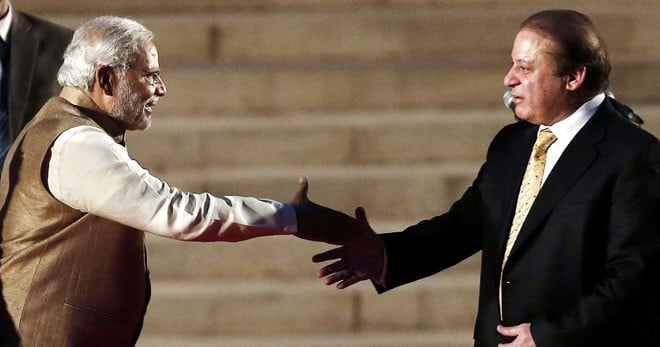
Did we expect an overnight change of hearts and a solution of the irritants that mar the bilateral relations? This was the first opportunity to see the hardliner anti-Pakistan Modi and the pro-peace Nawaz Sharif get their act together

The Indian and Pakistani foreign secretary level talks may have been called off -- does that translate into cancellation or postponement we don’t know -- but talk we shall. In newspapers, on television, in private conversations, on public forums. Today’s Special Report is a testimony of this sense of resentment at this and other political decisions that act as a dampener on the prospects of peace. In Pakistan, the news of the calling off of talks was downplayed because the entire nation was hooked on to watching and listening to its ‘leaders’ gathered in the capital in an attempt to unseat the government in power.
So, what exactly was the significance of these talks? Did we expect an overnight change of hearts and a solution of the irritants that mar the bilateral relations? This, indeed, was the first opportunity to see the hardliner anti-Pakistan Modi and the pro-peace Nawaz Sharif, both pro-business leaders, get their act together. In that sense, it was an opportunity lost.
But that’s just a simplistic reading of events. The domestic politics in both countries has played a tangible role in shaping the relations this way. Kamila Hyat in her piece explains that Modi’s response to Pakistan’s High Commissioner in India meeting Hurriyat leaders from Kashmir came "after fierce criticism… from the ‘liberal’ Congress Party".
Pakistan’s domestic politics is much more complicated. The civilian government’s resolve of having good relations with India is said to be at the heart of the now hardened civil military crisis.
In Sanaa Ahmed’s words "The unofficial word from Islamabad is that Pak-India trade is over for now, in line with unofficial advice from Rawalpindi."
The other irritants which form the subtext of these major political currents are: strict visa policy, MFN status, Indus Water Treaty in doldrums, Samjhota Express and Mumbai trials, Siachin Glacier, tension along LoC, prisoners exchange, and Sir Creek.
There are, of course, exceptions like people from Pakistan travelling to India for medical treatment and, in most cases, getting their visas in less than 24 hours. Designers are crossing borders and taking their products albeit with some difficulty, especially in visas.
Any meaningful engagement between India and Pakistan has been put on the backburner for now. Maybe talking about talks going mute would generate some life into them again.